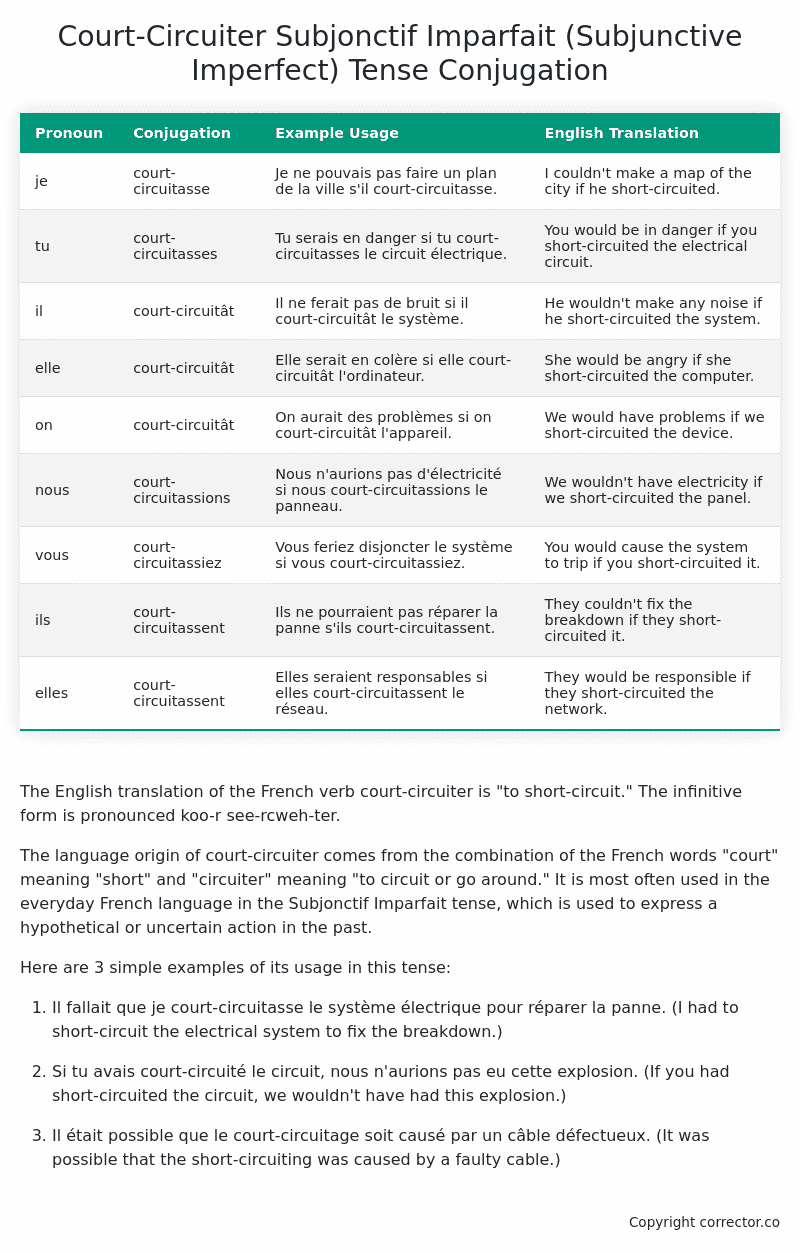Subjonctif Imparfait (Subjunctive Imperfect) Tense Conjugation of the French Verb court-circuiter
Introduction to the verb court-circuiter
The English translation of the French verb court-circuiter is “to short-circuit.” The infinitive form is pronounced koo-r see-rcweh-ter.
The language origin of court-circuiter comes from the combination of the French words “court” meaning “short” and “circuiter” meaning “to circuit or go around.” It is most often used in the everyday French language in the Subjonctif Imparfait tense, which is used to express a hypothetical or uncertain action in the past.
Here are 3 simple examples of its usage in this tense:
-
Il fallait que je court-circuitasse le système électrique pour réparer la panne. (I had to short-circuit the electrical system to fix the breakdown.)
-
Si tu avais court-circuité le circuit, nous n’aurions pas eu cette explosion. (If you had short-circuited the circuit, we wouldn’t have had this explosion.)
-
Il était possible que le court-circuitage soit causé par un câble défectueux. (It was possible that the short-circuiting was caused by a faulty cable.)
Table of the Subjonctif Imparfait (Subjunctive Imperfect) Tense Conjugation of court-circuiter
| Pronoun | Conjugation | Example Usage | English Translation |
|---|---|---|---|
| je | court-circuitasse | Je ne pouvais pas faire un plan de la ville s’il court-circuitasse. | I couldn’t make a map of the city if he short-circuited. |
| tu | court-circuitasses | Tu serais en danger si tu court-circuitasses le circuit électrique. | You would be in danger if you short-circuited the electrical circuit. |
| il | court-circuitât | Il ne ferait pas de bruit si il court-circuitât le système. | He wouldn’t make any noise if he short-circuited the system. |
| elle | court-circuitât | Elle serait en colère si elle court-circuitât l’ordinateur. | She would be angry if she short-circuited the computer. |
| on | court-circuitât | On aurait des problèmes si on court-circuitât l’appareil. | We would have problems if we short-circuited the device. |
| nous | court-circuitassions | Nous n’aurions pas d’électricité si nous court-circuitassions le panneau. | We wouldn’t have electricity if we short-circuited the panel. |
| vous | court-circuitassiez | Vous feriez disjoncter le système si vous court-circuitassiez. | You would cause the system to trip if you short-circuited it. |
| ils | court-circuitassent | Ils ne pourraient pas réparer la panne s’ils court-circuitassent. | They couldn’t fix the breakdown if they short-circuited it. |
| elles | court-circuitassent | Elles seraient responsables si elles court-circuitassent le réseau. | They would be responsible if they short-circuited the network. |
Other Conjugations for Court-Circuiter.
Le Present (Present Tense) Conjugation of the French Verb court-circuiter
Imparfait (Imperfect) Tense Conjugation of the French Verb court-circuiter
Passé Simple (Simple Past) Tense Conjugation of the French Verb court-circuiter
Passé Composé (Present Perfect) Tense Conjugation of the French Verb court-circuiter
Futur Simple (Simple Future) Tense Conjugation of the French Verb court-circuiter
Futur Proche (Near Future) Tense Conjugation of the French Verb court-circuiter
Plus-que-parfait (Pluperfect) Tense Conjugation of the French Verb court-circuiter
Passé Antérieur (Past Anterior) Tense Conjugation of the French Verb court-circuiter
Futur Antérieur (Future Anterior) Tense Conjugation of the French Verb court-circuiter
Subjonctif Présent (Subjunctive Present) Tense Conjugation of the French Verb court-circuiter
Subjonctif Passé (Subjunctive Past) Tense Conjugation of the French Verb court-circuiter
Subjonctif Imparfait (Subjunctive Imperfect) Tense Conjugation of the French Verb court-circuiter (this article)
Conditionnel Présent (Conditional Present) Tense Conjugation of the French Verb court-circuiter
Conditionnel Passé (Conditional Past) Tense Conjugation of the French Verb court-circuiter
L’impératif Présent (Imperative Present) Tense Conjugation of the French Verb court-circuiter
L’infinitif Présent (Infinitive Present) Tense Conjugation of the French Verb court-circuiter
Struggling with French verbs or the language in general? Why not use our free French Grammar Checker – no registration required!
Get a FREE Download Study Sheet of this Conjugation 🔥
Simply right click the image below, click “save image” and get your free reference for the court-circuiter Subjonctif Imparfait tense conjugation!

Court-Circuiter – About the French Subjonctif Imparfait (Subjunctive Imperfect) Tense
Formation
Common Everyday Usage Patterns
Interactions with Other Tenses
Subjonctif Présent
Indicatif Passé Composé
Conditional
Conditional Perfect
Summary
I hope you enjoyed this article on the verb court-circuiter. Still in a learning mood? Check out another TOTALLY random French verb conjugation!


